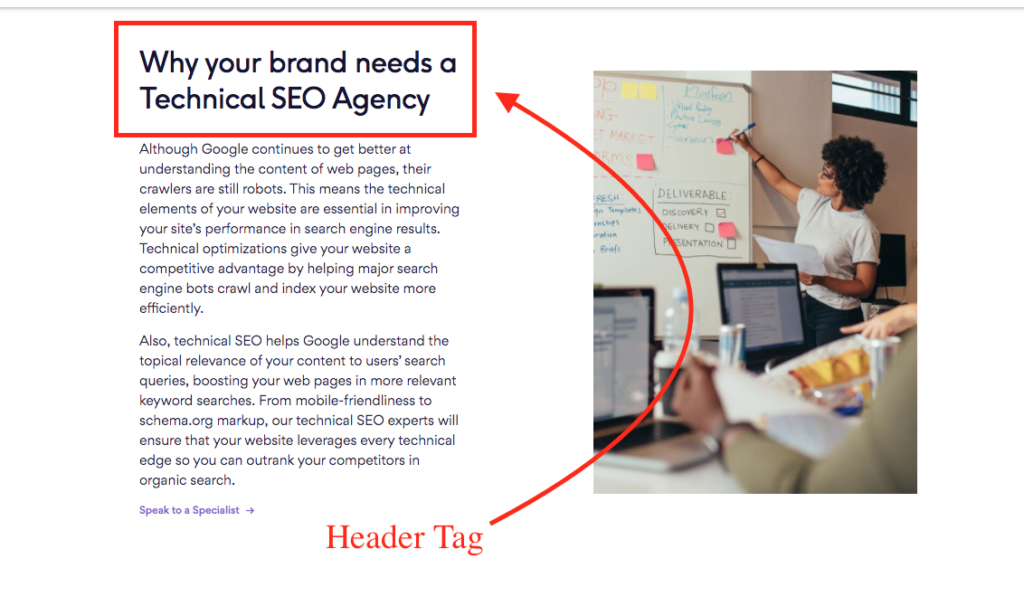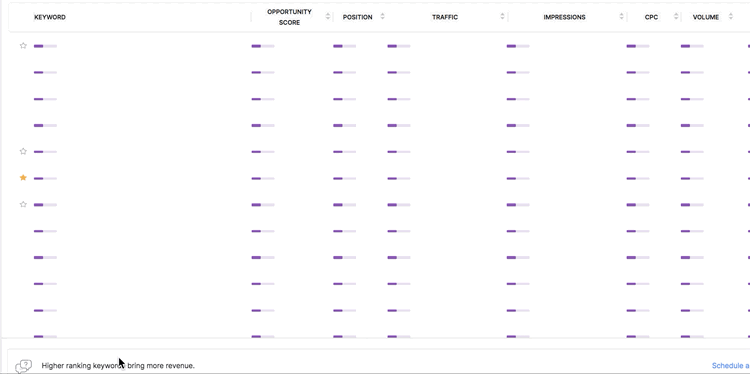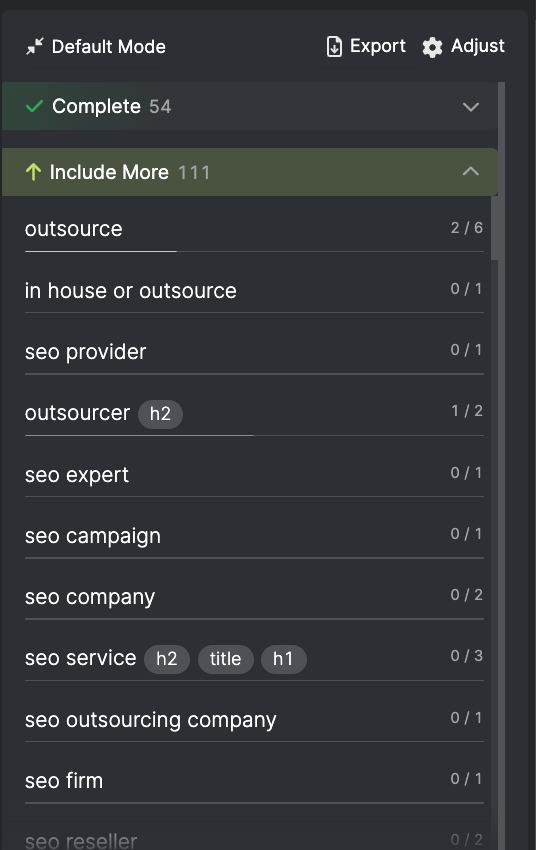How to do SEO Copywriting with the SEO Content Assistant
Chances are, you’ve heard the phrase “content is king” in relationship to digital marketing and search engine optimization (SEO). But what exactly does this mean? In the […]
Chances are, you’ve heard the phrase “content is king” in relationship to digital marketing and search engine optimization (SEO). But what exactly does this mean? In the digital world, creating content is the primary way to get your landing pages showing up for relevant keyword searches in Google. And one of the core pillars of creating content that ranks is SEO copywriting.
After all, without words, how can your brand communicate with your target audience? Copywriting for SEO purposes is an exceptional way to attract users, boost your online visibility within search engines, while making your brand’s voice heard.
Here’s an introductory guide to the importance of SEO copywriting and how to use keywords and software tools to give your web page copy more SEO power.
What is SEO Copywriting?

In order to understand more about copywriting for SEO, it is important to understand exactly how SEO works, and how search engines present and choose their information.
Search engines are run by algorithms, with the goal of providing the most useful and relevant content to users. Above anything else, Google wants to show users high-quality content from trusted, authoritative websites. Their search engine algorithms work to understand how websites present their information and match it to user’s search intent. They do this through natural language processing and machine learning.
Keywords are the bridge that brings consumers to a website and a website in front of consumer’s eyes. When a user searches on Google, they type keywords into the search bar; anything from, “seo copywriting” to “best restaurants near me” can be considered a keyword phrase.
Making sure the keyword phrases that you want to rank for are in your web copy will make it easier for the search engine bots to understand what the web pages are about and add them to their index. So when a user then searches the same keywords that you have on your web page, Google will promote your website within the search engine result pages (SERPs).
So the definition of SEO copywriting is as follows:
The practice of writing high-quality, keyword-optimized content with the goal of ranking higher in the search engine results pages.
With the sheer number of websites on the Internet, how does Google know which websites to promote? Google chooses to display its websites in its search results based on many factors including the quality of the content, site authority of the website, and the page experience.
But content creation is more than just placing a keyword on a page and hoping Google sees it. Instead, Google measures authority and relevance by analyzing the content on each of your websites based on several additional factors such as readability, user experience, where you incorporate your keywords, which keywords you use, and how many times you use the keywords in your content.
Benefits of Investing in SEO Writing
Taking the time to create optimized, SEO web copy has so many benefits to your long-term digital strategy. Just a few include:
- Better readability for the search engine. You’ll stand out among the websites and other companies in your niche simply because your related keywords will catch the eyes of the search engines, and they’ll be better able to understand what you’re talking about!
- Attracting more traffic to your website, from your target audience, with minimal marketing costs
- Appearing on the first page of the Google search results for multiple keyword phrases
- Providing relevant, informative content to your readers, while increasing your conversions
- Building trust in your brand by providing your audience the information and the different types of content they are looking for.
With these benefits in mind, why wouldn’t you want to invest in creating valuable content with an SEO copywriter?
Why SEO Copywriting Matters for Keyword Rankings
Simply put, keyword rankings refer to all of the different keywords where your web pages show up in the search engine results pages. If your business only has a few landing pages or sells one core product, you will naturally have less keyword rankings. But if your company has expertise in multiple areas, the more content you create, the more keyword rankings you can earn.
With a good content strategy and a great SEO copywriting team, every relevant keyword presents a new opportunity for your web pages to rank in Google and reach your target audience.
You also want to keep your users in mind when creating your content. Think of it this way: There is likely more than one way to explain your products, services, and business as a whole, so you need to create web pages that include all of those various keywords associated with your industry or brand.
By creating high-quality content that can be read by both the search engine bots and prospective consumers, your business can thrive online.
What Webpage Elements Require Optimization?
Known as on-page SEO, optimizing your webpage elements will require doing more than just adding your exact match keyword phrase into your first paragraph. To achieve the top result in the Google SERPs, you need to optimize all of the visible and invisible content on your web pages.
URL Path
URLs tend to be automatically populated by your website server, but for the best user experience, you need to include the right keywords that describe what the page is all about.
The URL is usually the first thing people see before going to a new web page. Putting your target keyword in it not only will give context to users but the search engine as well. The URL path of the web page will also appear at the top of the SERP result.

URLs are the first thing the search engine crawls and reads, so you’ll want to use this valuable real estate to showcase your main keyword.
Page Title
The page title (or title tag) + is an HTML tag that allows you to give a web page a specific title. This title tag is also what shows up on the frontend for users in Google.

The goal of the title tag is to give a concise summary of a page’s content, making it important to use your main keyword within the title.
Meta Description
Meta descriptions provide a brief summary of the content on the web page. Their goal is to entice consumers to click through to the page while giving enough information to decrease the page’s bounce rate. They appear below the Page Title in SERP results.

The idea is that a meta description will provide a clear and condensed summary of the page, so the user knows what to expect when clicking.
Header Tags
Breaking up content into easily digestible paragraphs is the best way to encourage readers to consume your content. Plus, dividing up content allows for increased search engine readability, and the easiest way to do this is to divide your content into H1, H2, and H3 tags.

The higher the number of the header tag, the smaller the text will be. It’s always a good idea to use your focus keyword or phrase in the H1, then supplement the additional headers with secondary keywords.
What is the SEO Content Assistant?
At LinkGraph, we are proud to offer multiple SEO tools with the ultimate goal of boosting your digital marketing strategy. One of these tools is our SEO Content Assistant, which removes all the hard work and hassle for SEO copywriters.
From comprehensive keyword data to Focus Terms lists, the SEO Content Assistant helps guides writers through the SEO copywriting process.
With our simple tool, you are able to elevate the performance of any piece of content, whether it is already written or you are starting from scratch. Either login to your Search Atlas dashboard, or create a Search Atlas account.
Best of all, our tool allows you to optimize amazing content in all forms. That includes blog posts, homepage website copy, or off-site articles for your link building campaigns. Our primary goal with this tool is to help you get more SEO power into your web copy.
How to Use the SEO Content Assistant to Write Content
When using the SEO Content Assistant, everything will be in one place for you. It can help anyone from beginners to the most experienced SEO copywriters.
This tool allows you to optimize each piece of content for up to five separate keywords. This not only creates a better chance of you increasing your rankings, but diversifies your content as a whole.
Our software will suggest powerful Focus Terms for you to include. It will also confirm whether the on-page elements and keyword frequency that you need for each piece. By improving your content score, you will improve your ranking potential.
What Keyword Data Does the SEO Content Assistant Provide?
Choosing which keywords you need to use in your content writing is arguably the hardest part of your SEO strategy. For more insights into keyword research, read our detailed keyword guide.
However once you have chosen your keyword targets, simply input them into the keywords portion of the tool.
Once you’ve inputted your keywords, the tool will provide you also provide you suggested keywords to target based on semantic relevance. Click on the “+” to add those keyword targets to your list.
Understanding the Focus Terms List
After you’ve entered your keywords, our software will provide a list of Focus Terms for you to include into the content. You can organize the lis tof Focus Terms by Heading Presence, Importance, Search Volume, CPC, and Usage.
These focus terms can be anything related to your topic, from head terms which are shorter keywords, to long-tail keywords and subtopics. Depending on how many target keywords you have, the number of focus terms may vary.
By adding Focus Terms into your content, you will improve your overall content score (or the ranking potential of your content). Watch the below video to learn more about how to optimize an existing piece of content for better rankings in Google using the SEO Content Assistant.
Your end goal is to use the Focus Terms to improve your content score. The higher the score, the more in-depth and relevant your content will be. That means you can rank for more keywords and in higher positions.
Generally speaking, a content score over 80 can truly boost your content rank within the SERPs exponentially.
Why SEO Copywriters Need the SEO Content Assistant
Using this tool can bring so many advantages to SEO copywriters. Here are some of the reasons why SEO copywriters should invest in content optimization software like the SEO Content Assistant.
- Comprehensive Keyword Data. The SEO Content Assistant provides essential Keyword Data right in the tool so you can make sure you are optimizing for keywords that present the best opportunities.
- Improved Topical Depth. The Focus Terms lists helps you improve the length, depth, and breadth of your content. Also, it helps you answer more of your audience’s questions and send quality signals to crawlers.
- Comprehensive analytics from which to base your content strategy. Copywriters should always create content with specific goals in mind. Our tool gives you the data you need to reach that goal.
- Provide multiple options for your content creation strategy. Our content assistant has been used for SEO success for multiple brands as it is so versatile. A professional copywriter can use this tool to optimize an ecommerce site, newsletters, social media posts, ebooks, product descriptions, blog posts, landing pages, and all other forms of web content you can think of!
- Easy UI/UX for happy copywriting. The sleek interface of the tool makes SEO copywriting easy. Our tool highlights terms as you add them into your content so you can avoid keyword stuffing.
- Confirm Optimized Metadata. The Technicals feature of the tool will confirm whether or not the metadata on your web pages are setup and whether they are SEO friendly.
To learn more about this amazing tool for SEO copywriters, read our detailed guide on the SEO Content Assistant.
Conclusion
Our software tools can help you boost the readability, quality, and relevance of your content. If you need help with your SEO copywriting, our editorial team can create the best content possible. Contact us today for more information. We can provide a demo of how the SEO Content Assistant and our other SEO tools will work to amplify your brand’s visibility online.

















































































